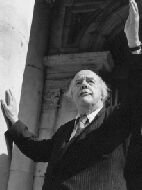


Cornwall's Poet Laureate
Sir John Betjeman CBE (28th August 1906 - 19th May 1984) was Poet Laureate and writer on architecture.
Sir John Betjeman, the former poet laureate is buried at St. Enodoc church. Sir John Betjeman, wrote of the church in "Sunday Afternoon Service At St. Enodoc" and today a slate headstone marks his grave. He had been fond of Cornwall since his childhood holidays spent there, and returned to Cornwall to live. There are many references to the Cornish landscape in his poetry such as: Cornish Cliffs, Trebetherick. Betjeman stuck to traditional verse forms and rhyme schemes, at a time when others flirted with free verse.
He was born in Highgate, London, the son of a furniture-maker of Dutch origin. The family name was Betjemann, with two 'n's. Along with the Battenbergs (Mountbatten), the Saxe-Coburg-Gothas (Windsor), and many others, they tried to make their name less Germanic during the First World War.
The family were at Trebetherick, near Polzeath, where his father owned property. He appears to have been really happy there.
John became a boarder at Dragon School, Oxford, aged eleven. And at 14 he went to Marlborough College, again as a boarder. He then progressed to Magdalen College, Oxford. Here he failed his divinity exams and left without a degree. He therefore became a teacher at Thorpe House School, Gerrard's Cross, before working as a private secretary, and then as a teacher at another prep school.
In his verse autobiography, 'Summoned by Bells' published in 1960, Betjeman tells the story of his boyhood and early adult life up to his employment as a teacher at a preparatory school.
He then got involved in the other love of his life, architecture, becoming in 1930 an assistant editor of The Architectural Review. In 1931, his first book of poems, Mount Zion, was published. His second book was Ghastly Good Taste, a commentary on the depressing story of the rise and fall of British architecture, published in 1934.
Soon afterwards he met and married Penelope Chetwode, the daughter of Field Marshal Lord Chetwode, a former Commander-in-Chief in India.. And they moved to Uffington in Berkshire. They had a son, Paul, in 1937.
His next book, 'Continual Dew', appeared in 1937. He also worked on the series of Shell Guides to the counties of England.
He continued to publish books until the outbreak of war, during which he was sent to Dublin as the Press Officer to the British Embassy. The IRA apparently considered assassinating him as a spy, but on reading his poetry decided that he could not be. Their daughter Candida was born in 1942 in Dublin, and they returned to England in 1943 to work in the Ministry of Information.
After the war, he continued with his writing, and became a radio and TV personality. 'Collected Poems' and 'Summoned by Bells', were both best sellers. His television documentaries included' and 'A Passion for Churches'.
His wife Penelope became a Catholic in 1948 and the couple drifted apart. In 1951 he met Elizabeth Cavendish, with whom he developed an immediate and lifelong friendship. Being cordially estranged from his wife Penelope who, as a Catholic, would not divorce him. He said of her: "I love nobody in the world more; but we just can't live together." Betjeman therefore either lived alone or with Lady Elizabeth Cavendish (a daughter of the Duke of Devonshire). She was to become the central feature of his life in the next quarter century.
In 1960 he was appointed Commander of the Order of the British Empire in the New Year Honours list.
Knighted in 1969, he became Poet Laureate in 1972, succeeding Cecil Day Lewis, and one of his first duties was to produce a poem in honour of the wedding of Princess Anne.
His last book of new poems, A Nip in The Air, was published in 1974. After that, he began to suffer from Parkinson's Disease, and a series of strokes reduced his mobility.
Sir John Betjeman died in Trebetherick on 19th May 1984. His grave is located near the south side of the church. The church itself is approached via the 10th fairway of the golf course.
Cornish Authors The John Betjeman Centre Cornwall's History Famous Cornish People